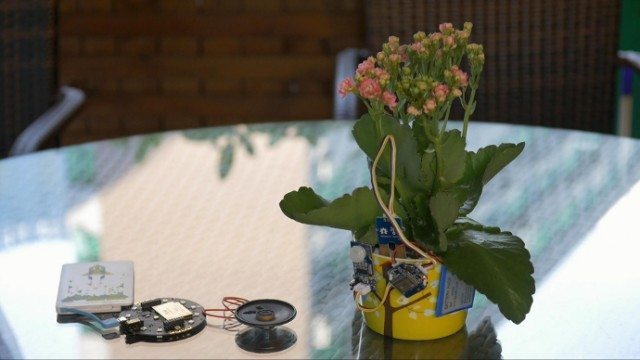ReSpeaker is a god-send to all botanists

Giving people the ability to control objects with their voice has typically been the domain of big tech companies: Amazon Echo, Google Home, Apple’s Siri. Shenzhen-based hardware company Seeed Studio wants to change that.
“You can take a plant and make it something you can talk to,” says Xiaobo Ye, the product manager of ReSpeaker. “Now, raising a plant will be like raising a dog or cat. It can tell me if it’s thirsty or, ‘I’m okay, I don’t need to drink water.’”
On Tuesday, Seeed Studio launched ReSpeaker on Kickstarter. About the size of a hockey puck, ReSpeaker is a hardware module that can make objects respond to voice commands and queries. Depending on what the user wants to control – an air conditioner, a stereo, a coffee machine – ReSpeaker can be connected via USB or wired in directly. Once connected, the hardware module can be programmed to carry out different actions, like making coffee or scheduling a meeting room.
By connecting ReSpeaker to WiFi, users can also access ReSpeaker’s web application and pick various ready-made applications, such as a music streaming app. Developers can also write their own custom plugins. Various hardware add-ons are available too, like a far-field voice capture mic array that helps ReSpeaker hear users as far as ten meters away.
One of the goals of ReSpeaker is to lower the barrier of voice recognition technology so that startups and hobbyists alike can turn any object – not just connected or ‘smart’ ones – into interactive devices. Through partnerships with third party companies, Seeed Studio has added various voice recognition software to ReSpeaker, such as Microsoft Cognitive Service, Amazon Alexa Voice Service, Google Speech API, Wit.ai and Houndify.
“If you’re Xiaomi, you can connect it all to an app,” says Ye, referring to Xiaomi’s wide range of smart home products. “But if you’re a startup , it’s really hard for you to do that.”
“You have to create your own app and your cost is actually about the same as Xiaomi’s, but your product offering is not as rich,” he says. “It doesn’t address as many use cases and thus can’t attract as many users.”
Since consumer-facing IoT took off a few years ago, large Chinese tech companies like JD and Xiaomi have been rushing to build their own smart home hubs and IoT ecosystems in order to build one platform to rule them all. It’s not a race that small companies and startups can win, but in a market estimated to reach US$1.7 trillion in 2020, there’s plenty of room for niche products and other services that entrepreneurs can tap into.
“Going forward, there will be more […] long tail companies that make products for specific contexts,” says Ye. “We hope that by selling these products to small companies, we can let them slowly grow into big companies.
ReSpeaker is not the first product to offer developers open source voice-control capabilities. Two years ago, two Princeton students created Jasper, an open source Siri-like platform. Instead of having custom hardware modules, however, Jasper runs through a Raspberry Pi.
On Kickstarter, ReSpeaker has surpassed its US$40,000 campaign, which is more about promoting Seeed Studio’s project than generating profit, says Ye. The company is starting with the overseas market first as ReSpeaker is only available in English for now. Going forward, Seeed Studio plans to add more plugins to its web application and work towards creating a platform where developers can share and leverage each other’s code.
—
The article This Kickstarter project lets you talk to your plants was first published on TechNode.
The post This Kickstarter project lets you talk to your plants appeared first on e27.
